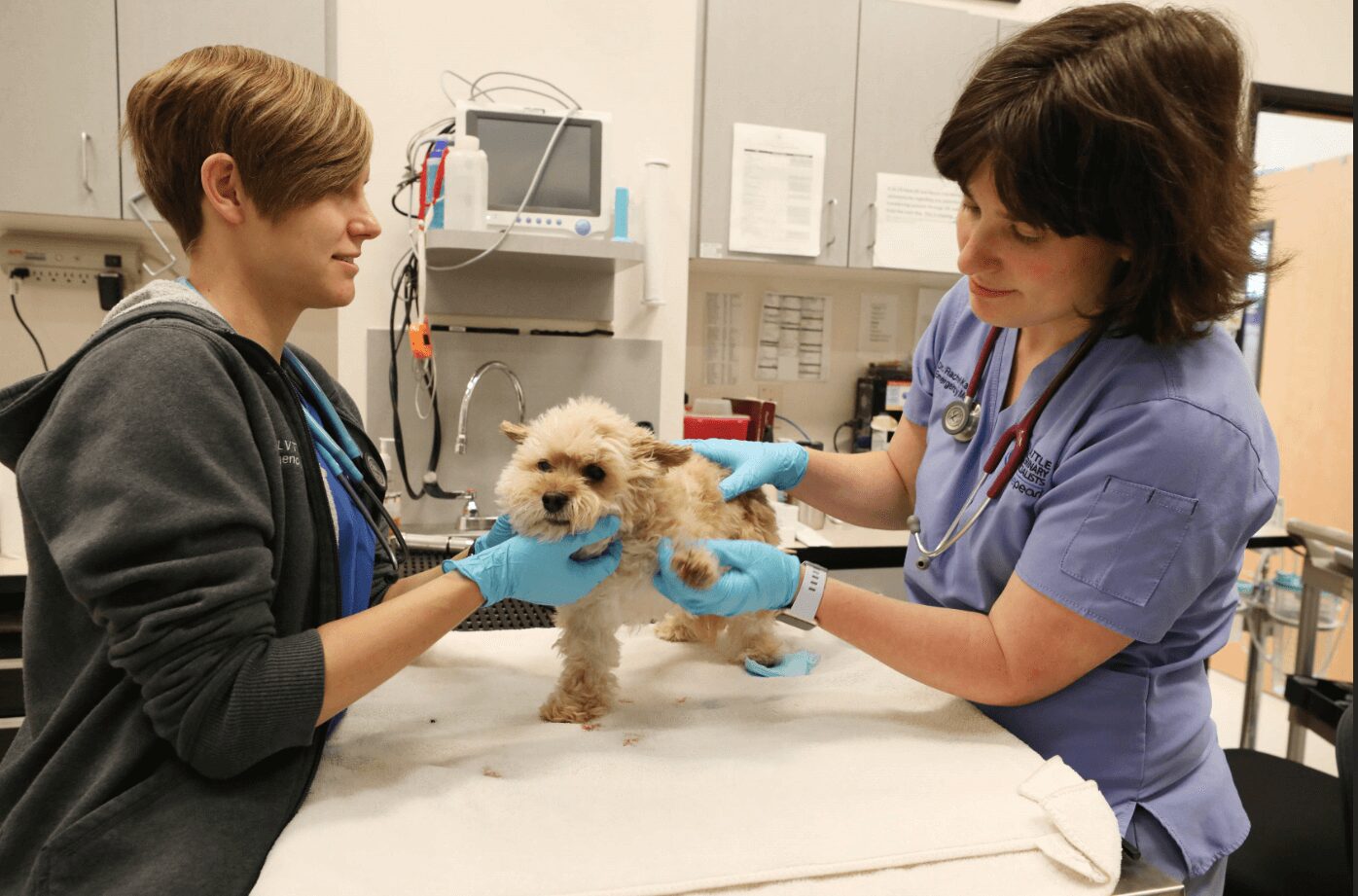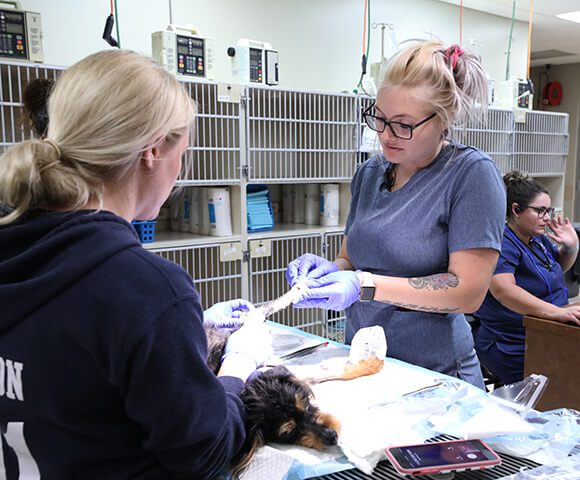What is gastroenteritis?
Acute gastroenteritis in dogs is the sudden onset of vomiting and diarrhea. It is one of the most common causes of emergency room visits in dogs and cats. The most common causes of this condition are inflammation, irritation or infection of the lining of the gastrointestinal tract.
While some episodes of gastroenteritis can resolve on their own without treatment, if the signs last a long time or keep coming back, a veterinarian can help rule out more serious systemic disorders and determine if medical or surgical intervention is necessary.
Signs and symptoms of gastroenteritis.
The most common signs that a dog is experiencing gastroenteritis include:
- Vomiting
- Diarrhea
- Occasional regurgitation
- Subtle signs of nausea or abdominal pain
Vomiting and diarrhea represent the upper (stomach) and lower (intestinal) aspects of gastroenteritis.
What’s the difference between vomiting and regurgitation?
Vomiting is the active process (with abdominal effort and retching) of expelling the stomach’s contents. This is different from regurgitation, where the expulsion of fluid or food is silent and passive. Some animals may have either or both signs, but they should be differentiated since the causes and diagnostic investigation may vary.
Either vomiting or regurgitation may contain fluid, food, bile or foreign material. In cases where the lining of the esophagus or stomach is irritated, blood may also be present in the contents.
Animals that are not actively vomiting may still be experiencing nausea. Nausea can be more subtle and may appear as little or no appetite, turning away from food or excessive salivation.
Diarrhea may come on suddenly and will often progress in frequency, amount, urgency and consistency over hours to days. It is helpful to provide your veterinarian with as much detail as possible as it can help them know which causes to focus on, including whether the small or large bowel is involved.
Abdominal pain with gastroenteritis can range from mild to severe. This may be difficult to gauge at home, however. Look for signs such as pacing, restlessness or unwillingness to move, or a ‘praying posture’ stance, which indicate that your pet may be experiencing abdominal pain.
Causes.
The most common cause of acute gastroenteritis in dogs of all ages is dietary indiscretion – the tendency of dogs to eat without discrimination. This could include table scraps, garbage, toys, clothes, cat poop and organic material, to name just a few. The consequences may be mild if the substance passes without much issue or significant if the substance is toxic, irritating or large enough to block the intestines.
Less obvious causes of acute gastroenteritis may also include a food protein intolerance, especially with recent diet changes, the introduction of a new treat or some infectious/parasitic causes.
Acute hemorrhagic diarrhea syndrome (AHDS), previously known as hemorrhagic gastroenteritis (HGE), is a common cause of acute, onset, severe bloody diarrhea in adult dogs and has been linked to Clostridial bacterial infections. Viral infections (such as parvovirus and distemper in puppies), parasites, protozoal or bacterial causes can occur in any age group depending on exposure, vaccine status and deworming history.
Because vomiting and diarrhea can be non-specific secondary signs of systemic disease, other organ systems that may be involved include:
- Acute pancreatitis
- Acute liver or kidney injury
- Hypoadrenocorticism (Addison’s disease)
- Complications from diabetes
- Restricted blood flow to the bowel
Getting a diagnosis.
Pets with one or two episodes of vomiting or diarrhea but otherwise feel okay and are eating and drinking normally may have self-limiting gastroenteritis that will resolve on its own. However, if they have extended bouts of vomiting or regurgitation, can’t keep down food or water, have no interest in drinking or eating, or are in pain, you should seek urgent veterinary care with your primary veterinarian or at an emergency veterinary hospital.
A thorough physical exam by a veterinarian can detect signs of dehydration, abdominal pain, fever and signs of severe fluid loss causing hypovolemic shock (when blood plasma levels are too low).
Depending on the individual case, a veterinarian may recommend the following diagnostic tests for pets with gastroenteritis symptoms:
- Lab work (such as complete blood counts and serum chemistries) to evaluate systemic status and rule in or rule out organ involvement.
- Resting cortisol (adrenal function testing) test.
- Blood pressure reading.
- Fecal antigen testing for parvovirus in puppies.
- Abdominal radiographs (x-rays). Three-view x-rays of the abdomen are an excellent initial screening test, especially when a radiologist can perform a formal interpretation. This can be diagnostic for bowel obstruction, foreign body ingestion, organ torsion, abdominal mass effects or free fluid.
- Abdominal ultrasound, which is a more advanced diagnostic test usually performed by specialists in a referral hospital or via mobile ultrasonography. This can give further visual information on the appearance of all organs, bowel thickness, presence or absence of obstructive disease, bowel contents, presence of free abdominal fluid, the appearance of the pancreas, or evidence of abdominal inflammation (peritonitis).
- Thoracic radiographs to evaluate the esophagus and for possible aspiration pneumonia in patients with regurgitation or protracted vomiting.
- Pancreatic lipase immunoassay to evaluate for pancreatitis.
- Infectious disease PCR testing and fecal ova or parasite testing.
It’s important to note that, in many cases, a specific diagnosis might not be reached, but these diagnostics can at least rule out other serious causes.
Questions for your pet’s doctor.
When consulting with your pet’s veterinarian, consider asking questions like:
- Does my dog need hospitalization, or is outpatient therapy appropriate in this case?
- Is the diet I’m feeding at home the best choice for my dog?
- My dog seems to have recurrent gastrointestinal signs and sensitivities – should I consider a more advanced work-up, novel protein diet or referral to an internal medicine specialist?
Treatment for gastroenteritis.
There are multiple supportive therapies your veterinarian or ER doctors may use if your dog has gastroenteritis:
Hydration.
The cornerstone of therapy is making sure the patient is hydrated. Your veterinarian may administer fluids under the skin (and have you continue with oral electrolyte therapies at home) if your pet is stable enough for outpatient treatment or by IV if your pet has severe fluid loss and needs hospitalization.
Scope/surgery.
If a foreign object is identified, endoscopic retrieval (if involving the esophagus/stomach) or surgical intervention may be needed.
Dietary change.
‘Feeding the gut’ has been proven to help restore intestinal health and accelerate recovery from multiple causes of gastroenteritis. Bland, digestible, low-fat diets in small, frequent amounts are usually recommended in treating gastroenteritis.
Feeding tube.
Some patients hospitalized with gastroenteritis may benefit from a short-term nasogastric feeding tube which can both suction stomach contents and prevent vomiting, as well as provide a route for small-volume liquid nutrition.
Anti-nausea medication.
Several anti-nausea medications exist both in injectable and pill formulations for hospital and home use.
Probiotics.
Probiotic powders and pastes can re-establish the bacterial balance in the intestinal tract.
Antacid medication.
Mucosal coating medications or antacids may be occasionally prescribed in patients with suspected gastrointestinal ulceration.
Pain relief medication.
Analgesics like injectable opioids or gabapentin are the safest for use in patients with acute gastroenteritis.
Appetite stimulants.
Appetite stimulants may be used in the short term, though most patients will resume eating as soon as pain and nausea are controlled.
Anti-microbial medication.
Antimicrobial medications may be used judiciously depending on your veterinarian’s assessment of the case: anti-parasitic, anti-protozoal or antibiotics may be prescribed if indicated.
Typically, no specific anti-diarrheal medications are used in small animals; diarrhea will improve as the underlying condition resolves.
Prevention.
A reliable way to avoid dietary indiscretion is by preventing your pet from eating things they find when out for a walk, unsupervised in a yard or at home.
Veterinary professionals recommend feeding dogs a high-quality diet from mainstream manufacturers such as Royal Canin, Purina or Hill’s with strict quality control and ingredient sourcing. Avoiding table scraps and rich treats in dogs with dietary sensitivities can also be helpful.
Lastly, monthly preventatives and complete immunization protocols are highly effective at preventing infectious diseases.
Prognosis.
In simple gastroenteritis, the prognosis is good to excellent for complete resolution. Most pets can return to normal activities and diet within a week. In more complex cases where hospitalization for fluid therapy and IV medications is required, the prognosis may be more variable. However, it is generally still considered good, especially if patients respond well to treatment and there aren’t any complications like aspiration pneumonia.
If you notice signs of gastroenteritis in your dog, bring them to your primary vet or an emergency vet for immediate treatment and diagnosis. If needed, they can refer you to a veterinary internal medicine specialist, who has the experience and resources available to diagnose and treat the underlying cause. Many BluePearl hospitals provide emergency and internal medicine services that can help treat acute gastroenteritis in dogs – find your nearest BluePearl Pet Hospital.


